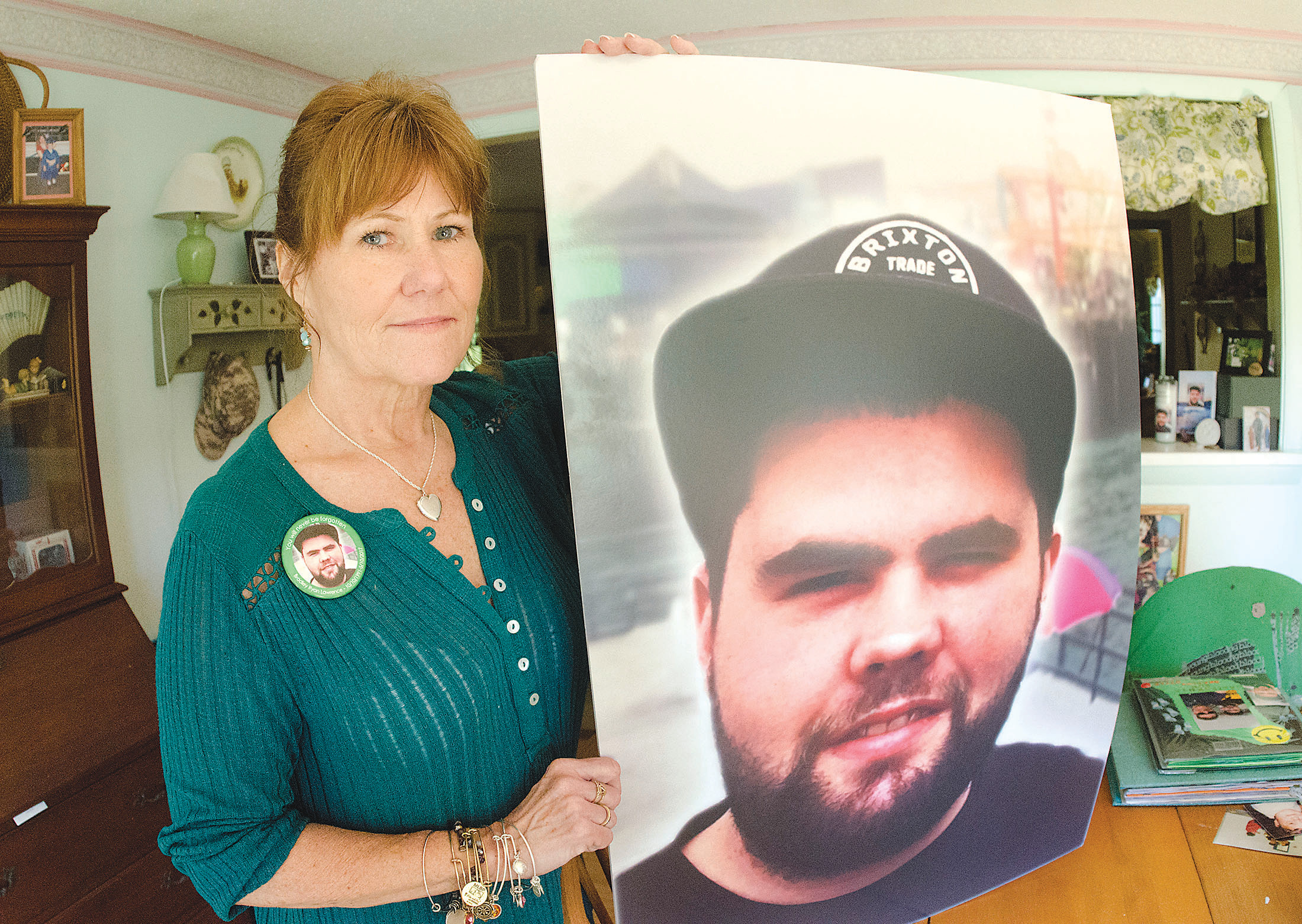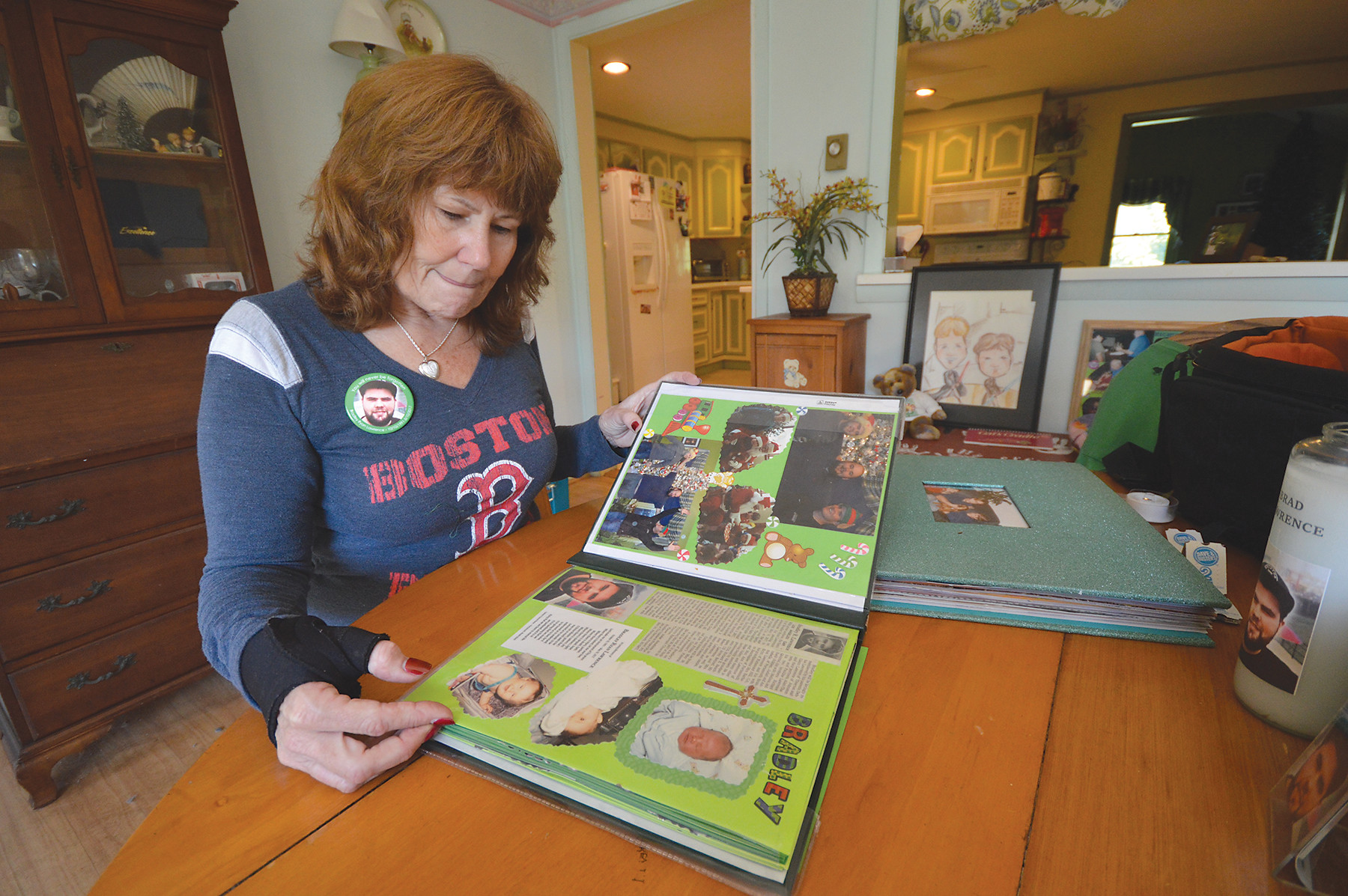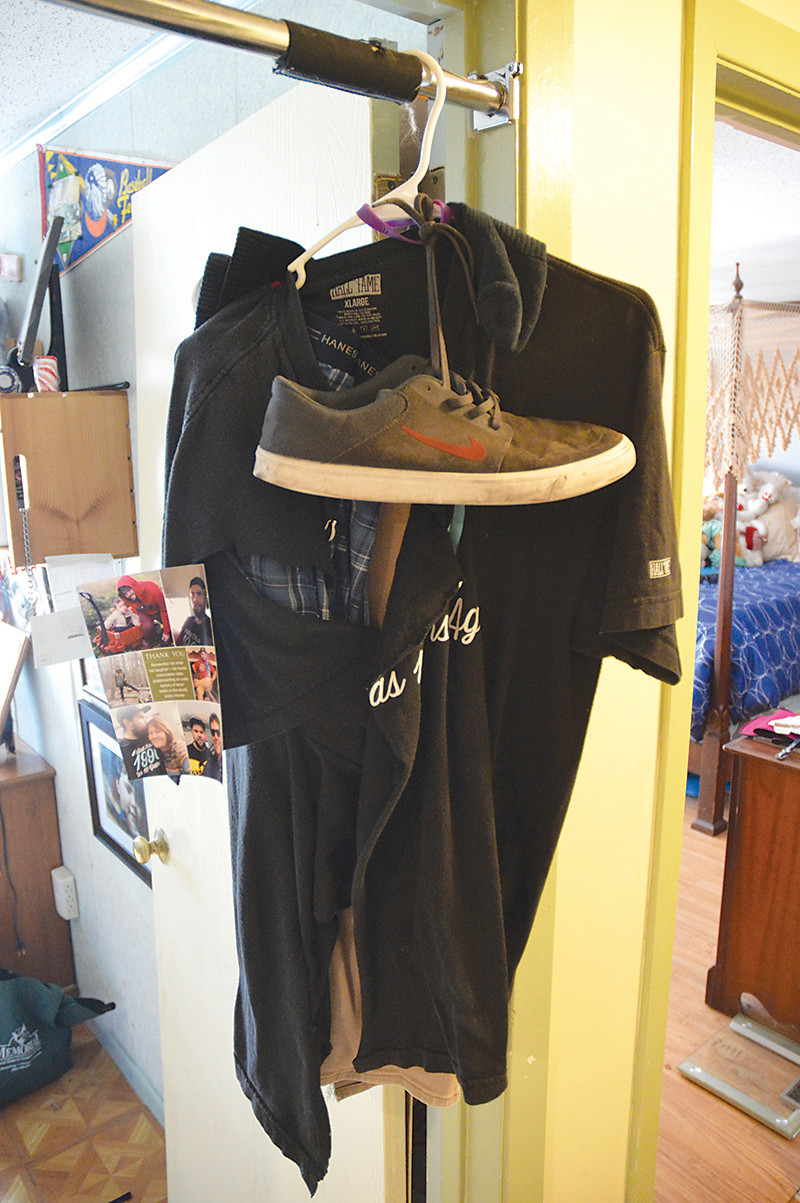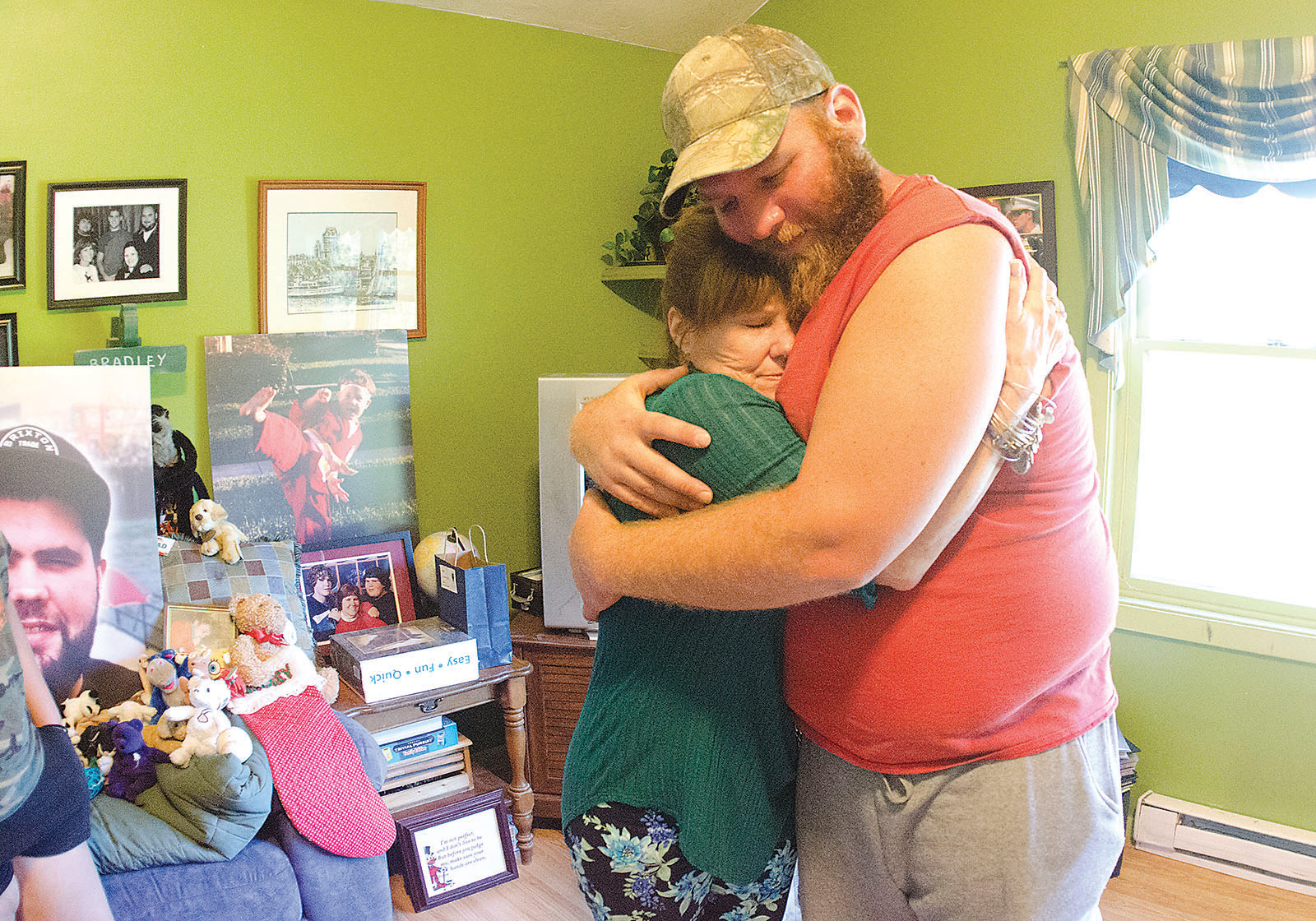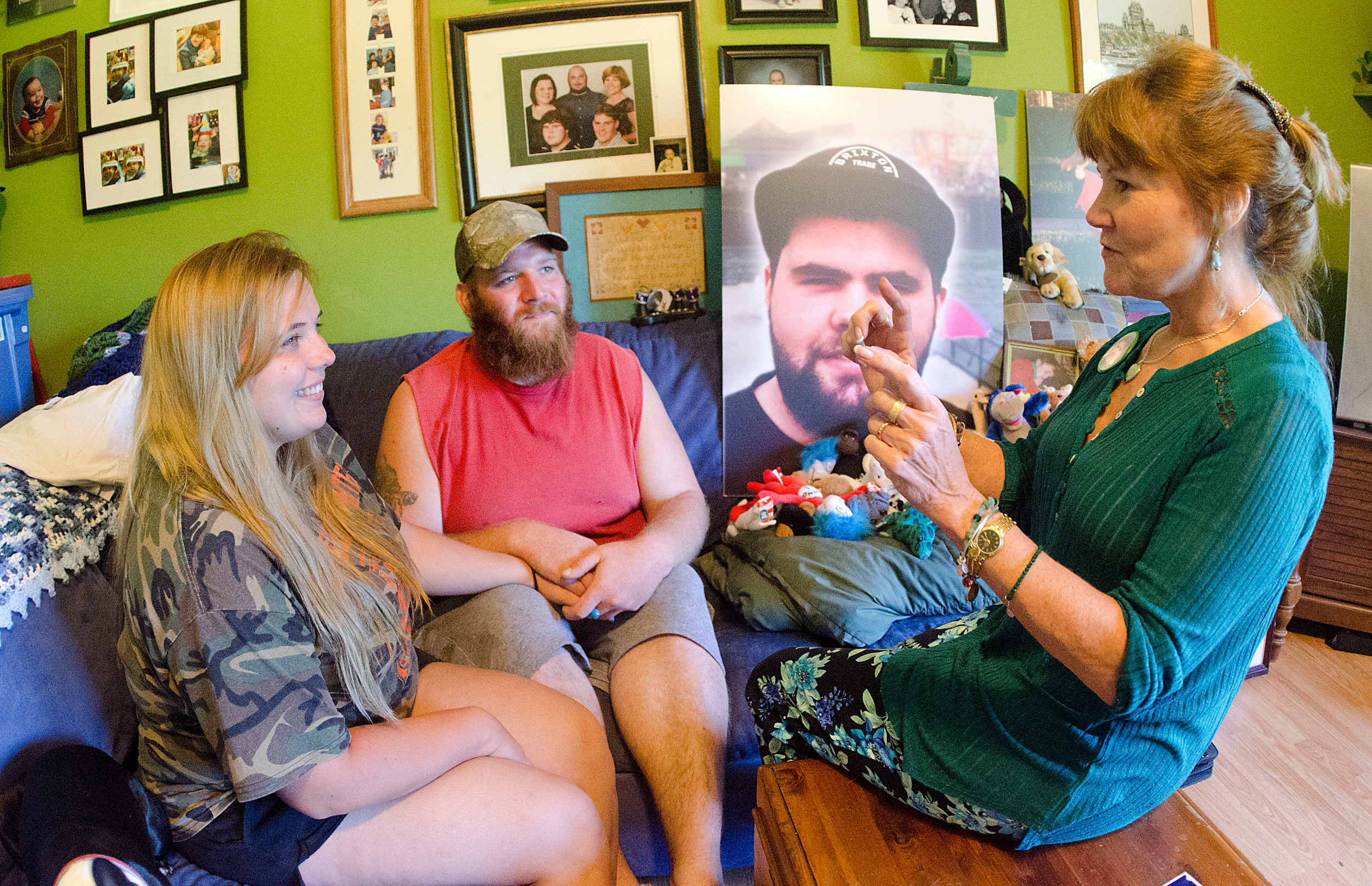- TUESDAY, APRIL 16, 2024
Portsmouth mom whose son died: ‘We need to do a better job’
Mother recounts late son’s unsuccessful battle with heroin addiction
PORTSMOUTH — Step in Debbie Lawrence’s small home in Common Fence Point and you cannot escape the memory of her son Bradley, who died May 10 at the age of 25. His body was found …
This item is available in full to subscribers.
Please log in to continue |
Register to post eventsIf you'd like to post an event to our calendar, you can create a free account by clicking here. Note that free accounts do not have access to our subscriber-only content. |
Day pass subscribers
Are you a day pass subscriber who needs to log in? Click here to continue.
Portsmouth mom whose son died: ‘We need to do a better job’
Mother recounts late son’s unsuccessful battle with heroin addiction

If you or your family has been impacted by opiate addiction, here are some resources recommended by The Moms Group:
• Clinical Services of Rhode Island (https://clinicalservicesri.com) offers a family support group facilitated by Peter Letendre at 6 p.m. every Wednesday at its King’s Grant office, 11 King Charles Drive, Suite A2.
• The Portsmouth Prevention Coalition meets from 8:30-10:30 a.m. the second Wednesday of every month, from September to June, in the second-floor conference room of Portsmouth Town Hall, 2200 East Main Road. The group has a website (portsmouthprevention.org) that will be up soon, as well as a Facebook page.
• Learn to Cope (learn2cope.org) offers meetings run by experienced facilitators. Its support group of family and friends touched by opioid addiction meets at 7 p.m. every Tuesday at St. Luke’s Hospital, 101 Page St., New Bedford.
• Kelly O’Loughlin (oloughlink@portsmouthschoolsri.org; 401/683-2124, ext. 2604) is the student assistance counselor at Portsmouth High School, and prevention and intervention are at the center of her work. Parents who have questions about substance abuse can always contact her, and all discussions are confidential.
PORTSMOUTH — Step in Debbie Lawrence’s small home in Common Fence Point and you cannot escape the memory of her son Bradley, who died May 10 at the age of 25. His body was found inside a car in a parking lot in Los Angeles.
In a corner of the living room is a virtual shrine to Brad, full of pictures of him with friends and family members — playing soccer, going through his karate moves, behind the controls of a video game.
FOR MORE: Read about a group of local moms whose children have suffered from addiction to opioids, and they're efforts to spread the word to other parents.
An unadorned Christmas tree, which Debbie hasn’t been able to take down, sits in another corner of the room.
“Bradley was supposed to have come home last Christmas,” she explained.
Brad’s ashes are kept in a green — his favorite color — box on the dining room table. Draped over a chair is a ratty and stained green shirt Brad used to love wearing, over the objections of his mom.
Hanging in the doorframe of Brad’s bedroom is another shirt — this one in pieces. Brad was wearing it when he died. After it was cut off for the autopsy, Debbie insisted it be sent to her. Maybe because she’s a nurse, she said.
“It was the same shirt he was wearing when he first went to California. I don’t know what to do with it,” said Debbie, who wears a button bearing Brad’s photo so he’s always with her.
Brad was a heroin addict who died after battling the disease for years. He had been in and out of treatment programs all around the country, but seemed healthy and happy when he came home for a family wedding in April, Debbie said.
Her renewed sense of hope was short-lived, however, as he died just two weeks later. Adding to his mother’s anguish is the frustration and confusion she feels, as there’s still an ongoing police investigation into Brad’s final hours.
“I still don’t have a definitive cause of death,” she said.
Debbie said she wanted to share her story with other parents as a wake-up call about the opioid scourge that’s ravaging too many young lives — and to let them know it can happen to any family.
“We need to do a better job. I don’t want another mother to go through what I had to go through,” she said.
Debbie maintains she had all the available tools to deal with an addicted child, yet it still wasn’t enough.
“I understand the nature of the disease as I’m an alcoholic; my sobriety date is June 3, 1988,” she said. “My son suffered an addiction to heroin and I couldn’t save him, even though I’m a mom, I’ve been sober, and I’m a nurse. And it still caught me off guard.”
Although he quit before graduating, Brad was a member of the ill-fated Portsmouth High School Class of 2010, which included several boys who either died of drug overdoses or struggled with addiction. His best friend died in 2014 and another one passed the following year, Debbie said.
“Bradley hung around with 10 kids since kindergarten and there are five left. They grew up in diapers together, they went to day care together — glued to the hips. We would inherit the whole tribe for the weekend; they were a tight-knit group,” she said. “Bottom line, is this an epidemic, is this a disease? Yeah, it is.”
Brad was the youngest of three sons, and his mom and dad divorced before his first birthday. He was much like any other kid and very active growing up, playing soccer in Portsmouth Pirates, earning a black belt in karate. He played the drums and was into snowboarding and skateboarding.
Brad was a character who loved to make people laugh and was grateful for the little things, his mom said. “Anything you gave him, he would sleep with for a couple of days because he was so appreciative,” she said.
When it started
The turning point came in 2007, Debbie believes. That’s when her middle son graduated from PHS and went off to military school, leaving her alone at home with Brad. “That was devastating for me, but it really impacted Bradley more than I thought it would,” she said.
Two years later, when her dad died of leukemia, Debbie believes Brad started experimenting with opioids. “I noticed a difference. He would nod out. Another warning sign were the missing teaspoons,” she said.
Debbie went through Brad’s room.
“I found needles in his Pokemon tins,” she said. “I didn’t know what that was. Out of all my boys, I never would have imagined him using a needle. He had to do the EMLA (numbing) cream before he had blood drawn.”
She found more red flags: burnt teaspoons, cotton balls and Q-tips. There were few warning signs, Debbie said.
“He smoked cigarettes,” she said, adding that she always came down on Brad for that because of his asthma. “As far as marijuana goes, I’m sure he did it but I didn’t pick up on it. If he was drinking, I could smell it.”
She doesn’t know where Brad got the heroin, although she’d ask him. “He said, ‘Mom, you just know.’”
During his senior year at PHS, Brad and some of his friends decided to quit school. “He had slowly gotten out of all his activities. He was only fixated on the next high,” she said.
Some parents gave permission for their kids to drop out, Debbie said, but not her. “I wouldn’t sign for Bradley, but when he turned 18 he signed himself out,” she said, adding that Brad later earned his GED.
‘Nasty’ ride
Being the parent of an addict is not only terrifying but full of self-doubt, she said. How do you help them without being an enabler?
“It is a nasty roller coaster ride living with someone who’s addicted to heroin and I didn’t know how to kick him out, (but) he had to get out of my house; day treatments were not working.”
Brad started in rehab programs about four years ago, through American Addiction Centers. He first went to Nevada, but “jumped the wall” after a week, Debbie said. Then he ended up in a treatment facility in Florida where he did pretty well, but the family ran out of insurance — a typical roadblock for families dealing with addiction.
“He was told he had to leave, so he came home and stayed with his dad in East Providence. He was going to outpatient there, but that didn’t work. He ended up running away and coming here. And I didn’t tell anyone. I enabled him and protected him and didn’t know what else to do,” Debbie said.
Brad later completed a 35-day treatment program in Texas in March 2015 but was discharged with little guidance, Debbie said. “He was told he needed to find a halfway house, without any encouragement, help or follow-through. I’m not pointing fingers, but I understand the nature of the disease as I’m an alcoholic,” she said.
The problem with rehab centers, said Debbie, is they take people out of society.
“We take care of them with food, shelter, clothing and satisfy every one of their needs and then throw them back out in a halfway house in society. ‘Now get a job,’” she said. “What tools are you given? You’re given the 12 steps of the program and eventually they’ll click in. But there’s a big difference between drugs and alcohol. These kids need more CBT (cognitive behavioral therapy) treatment. How do you live, function, get up in the morning?”
Brad ended up in Colorado but got kicked out of the halfway house. “He was living in a hotel room and he was pretty much homeless,” Debbie said. “I bought a ticket to go to Colorado, and two tickets to go home, saying if he chooses to stay there there’s nothing more I can do.”
Debbie said when she finally saw Brad, he was skin and bones and looked like a homeless person. “There was no soul. I looked in his eyes and there was nothing there. I hugged him and it was like hugging a wall. I died inside — it crushed me.”
Brad was 23 at the time.
More treatment
He did come home, however. Debbie got him a bed at the Gosnold Treatment Center in Cape Cod, where he went through a detox program before a 30-day stay at the affiliated Miller House.
“It’s $6,000 a month to stay there — out of pocket, no insurance,” said Debbie. “You go to any length when you love your child. I would have mortgaged my house. But I could not continue that unless I knew it was really working.”
After Miller, Brad got into a halfway house and got a job. But eventually he started using again, starting with the narcotic Suboxone — “It was prescribed to somebody in the house,” Debbie said — which led back to heroin.
In December 2015 Brad was arrested for possession when an undercover cop followed him to a parking lot, where his dealer awaited. He got probation the following month and entered a 90-day program at Awakenings Lodge in Cape Cod, where he was placed on methadone. While there he met a woman and they moved into an apartment together in North Attleboro in the summer of 2016. He got a job at Subway, but things didn’t work out with the girlfriend and Brad started using heroin again, in addition to the methadone.
“It progressively got worse,” said Debbie. “I’m not sure how these kids pass the tests they take … or get the stuff they need.”
An ultimatum
On Oct. 31, 2016, Debbie picked Brad up, took him to a restaurant and delivered an ultimatum: He could either live in a homeless shelter, on the street or find some place more stable. He stormed out, but returned 20 minutes later in tears.
“I look at that as hope,” she said, noting that at the time another son, an Army engineer, was on the front lines in Afghanistan. “Bradley had a greater risk of dying with this disease than my other son. That hit somewhere with Bradley. It jarred something within him.”
Despite his self-loathing, Brad always wanted to get well and be a better person, his mom said. During his rehab treatments Brad was required to keep journals, which Debbie still has in her home.
“It’s so heart-wrenching to read how much hatred your child has for himself,” she said. “One of the things he had to do was write his own obituary. The first sentence was, ‘You’re a piece of (expletive), you’re no good,’ and then he scribbled that out and he said what he wanted to be remembered for: He wanted the respect and love of his family.”
Brad said he had always wanted to go to California, so they found an American Addiction Centers location that offered CBT treatment.
“He went to California on Nov. 4. He did very well there. He got off methadone and he got off everything. He sounded better than ever,” said Debbie, who spoke and texted with Brad often.
Her optimism was renewed when Brad came home for his brother’s wedding in late April of this year. “He had his soul back. He had substance. I honestly got my son back and for those 10 days he was here, he was phenomenal,” said Debbie, who remembers Brad and his partner doing a little dance and bumping during the introductions. “That was totally out of character for Bradley.”
He left for California on May 4 because he had to work the next day. Six days later, Brad’s body was found in a car parked at a Rite Aid hours after meeting up with someone who most likely supplied him drugs, she said.
Besides dealing with the grief of losing a son at such a young age, Debbie is still looking for answers about Brad’s last hours, which were spent in someone else’s car. She’s still not sure if he died of a drug overdose because Brad also had chronic asthma, a seizure disorder and other medical issues. There were also no drugs found in the car, although Debbie suspects they were removed before police arrived.
Debbie, however, said she could actually take some comfort if she eventually learns Bradley died of an overdose. “If it is confirmed that he died of a heroin overdose, I know he went to the euphoric state and he didn’t suffer. If that’s the conclusion, I would feel much more comfortable, if that makes any sense, rather than him seizing out or having an asthma attack.”
Throughout her son’s ordeal, Debbie said Brad always had a bed. She insisted on that. “On May 10, what my heart is believing is that God had a bed for him and it was his turn. As much as I disagree and think God should be fired, he had a bed,” she said.
‘Open your eyes’
Debbie wants other Portsmouth parents to realize that heroin is available locally.
“People are buying it here; they’re not just going to Fall River,” she said. One time, she and Brad attended a party at the nearby Common Fence Point Community Hall, and he left the building for just a few minutes.
“He had gone to the playground, got something, and came back,” Debbie said, noting that her son did the same thing later that night while back at home. Except for those two short periods — Brad routinely went outside to smoke — he had been with his mother the entire time.
“He didn’t leave Common Fence Point,” she said.
Portsmouth parents are too quick to judge families that are dealing with addiction, said Debbie, adding she knows local parents who are blind to their own children’s drug use.
“Don’t listen to what their words are saying, but listen to what their actions are saying,” she said. “Open your eyes. Addiction is a cunning, baffling, powerful disease. It starts with a mental condition — depression, anxiety, withdrawing. We have to get over this stigma of mental illness. Look in your backyard. How many of our kids that Bradley went to school with have died? It’s in our backyard.”
What happened to Brad could happen to any child, she said.
“These kids need your support. They need your awareness. It happened in my house, in my son’s bedroom, which is right next to my bedroom, unbeknownst to me. And my house is not big,” she said. “It leaves a hole in your heart that you’ll never, ever be able to understand unless you’ve been through it.”
Brad wasn’t just a heroin addict, she said.
“He was a brother, a son, a grandson, an uncle and a friend,” Debbie said. “Go home and hug your kid. Tell them you love them. When’s the last time you did? I would give anything — absolutely anything — for one more chance.”
Keywords
The Moms Club, Portsmouth Prevention Coalition, opioids, substance abuse addictionOther items that may interest you

